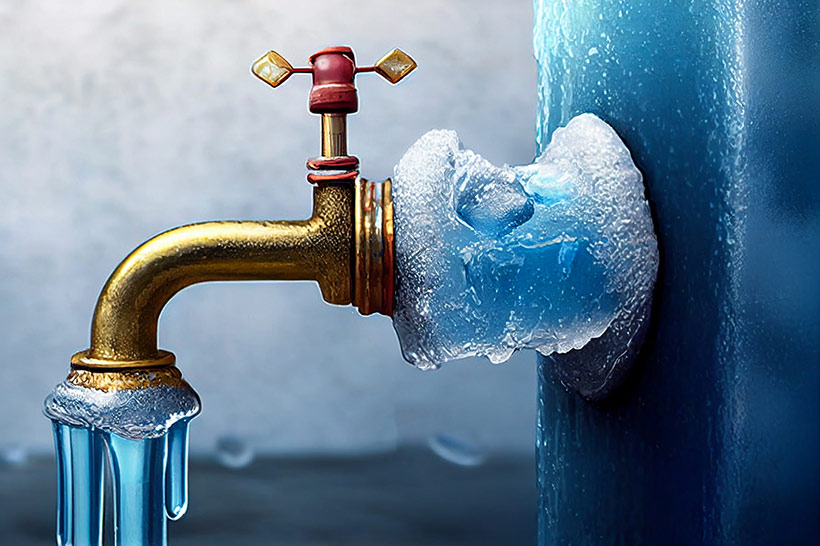Guidance for Avoiding Frozen Pipes in Winter: Expert Advice
Guidance for Avoiding Frozen Pipes in Winter: Expert Advice
Blog Article
Here in the next paragraphs you will discover a bunch of good content involving Winter Plumbing Precautions: Preventing Frozen Pipes.

Winter can wreak havoc on your pipes, specifically by freezing pipelines. Right here's just how to avoid it from taking place and what to do if it does.
Introduction
As temperature levels decline, the risk of frozen pipelines rises, possibly bring about expensive fixings and water damages. Comprehending just how to stop icy pipes is essential for house owners in cold environments.
Avoidance Tips
Protecting prone pipes
Wrap pipelines in insulation sleeves or make use of warmth tape to protect them from freezing temperature levels. Focus on pipelines in unheated or exterior locations of the home.
Home heating techniques
Keep interior rooms appropriately heated, especially areas with pipes. Open cupboard doors to permit cozy air to flow around pipes under sinks.
How to determine icy pipes
Look for reduced water circulation from faucets, uncommon smells or sounds from pipelines, and visible frost on subjected pipelines.
Long-Term Solutions
Structural modifications
Think about rerouting pipes away from outside walls or unheated locations. Include added insulation to attics, cellars, and crawl spaces.
Updating insulation
Purchase top notch insulation for pipes, attics, and wall surfaces. Proper insulation aids keep consistent temperatures and minimizes the risk of frozen pipelines.
Securing Outside Plumbing
Yard hose pipes and outside taps
Disconnect and drain pipes garden hoses prior to wintertime. Install frost-proof spigots or cover outdoor faucets with shielded caps.
Understanding Icy Pipes
What triggers pipelines to freeze?
Pipes freeze when subjected to temperature levels below 32 ° F (0 ° C) for expanded durations. As water inside the pipes ices up, it expands, putting pressure on the pipe walls and possibly causing them to rupture.
Risks and damages
Icy pipelines can cause water disturbances, residential or commercial property damages, and expensive repair work. Burst pipes can flood homes and create substantial architectural damage.
Signs of Frozen Water Lines
Recognizing frozen pipes early can stop them from breaking.
What to Do If Your Pipelines Freeze
Immediate actions to take
If you presume frozen pipelines, keep faucets open up to soothe pressure as the ice thaws. Make use of a hairdryer or towels soaked in warm water to thaw pipelines gradually.
Conclusion
Protecting against frozen pipelines requires positive procedures and fast feedbacks. By recognizing the causes, indications, and preventive measures, home owners can secure their pipes during cold weather.
Helpful Tips to Prevent Frozen Pipes this Winter
UNDERSTANDING THE BASICS: WHY PIPES FREEZE AND WHY IT’S A PROBLEM
Water freezing inside pipes is common during the winter months, but understanding why pipes freeze, and the potential problems it can cause is crucial in preventing such incidents. This section will delve into the basics of why pipes freeze and the associated problems that may arise.
THE SCIENCE BEHIND FROZEN PIPES
When water reaches freezing temperatures, it undergoes a physical transformation and solidifies into ice. This expansion of water as it freezes is the primary reason pipes can burst. As the water inside the pipe freezes, it expands, creating immense pressure on the walls. If the pressure becomes too great, the pipe can crack or rupture, leading to leaks and water damage.
FACTORS THAT CONTRIBUTE TO PIPE FREEZING
Low Temperatures: Extremely cold weather, especially below freezing, increases the risk of pipes freezing. Uninsulated or Poorly Insulated Pipes: Pipes located in unheated areas, such as basements, crawl spaces, or attics, are more prone to freezing. Insufficient insulation or lack of insulation altogether exacerbates the problem. Exterior Wall Exposure: Pipes running along exterior walls are susceptible to freezing as they encounter colder temperatures outside. Lack of Heating or Temperature Regulation: Inadequate heating or inconsistent temperature control in your home can contribute to frozen pipes. PROBLEMS CAUSED BY FROZEN PIPES
- Pipe Bursting: As mentioned earlier, the expansion of water as it freezes can cause pipes to burst, resulting in significant water damage.
- Water Damage: When pipes burst, it can lead to flooding and water damage to your property, including walls, ceilings, flooring, and personal belongings.
- Structural Damage: Prolonged exposure to water from burst pipes can compromise the structural integrity of your home, leading to costly repairs.
- Mold and Mildew Growth: Excess moisture from water damage can create a favorable environment for mold and mildew growth, posing health risks to occupants.
- Disrupted Water Supply: Frozen pipes can also result in a complete or partial loss of water supply until the issue is resolved.
WHY CERTAIN PIPES ARE MORE PRONE TO FREEZING
- Location: Pipes located in unheated or poorly insulated areas, such as basements, crawl spaces, attics, or exterior walls, are at higher risk of freezing.
- Exterior Pipes: Outdoor pipes, such as those used for irrigation or exposed plumbing, are particularly vulnerable to freezing as they are directly exposed to the elements.
- Supply Lines: Pipes that carry water from the main water supply into your home, including the main water line, are critical to protect as freezing in these lines can affect your entire plumbing system.
- Underground Pipes: Pipes buried underground, such as those connected to sprinkler systems or outdoor faucets, can be susceptible to freezing if not properly insulated.
https://busybusy.com/blog/helpful-tips-to-prevent-frozen-pipes-this-winter/
.jpg)
As an enthusiastic reader on How to prepare your home plumbing for winter weather, I assumed sharing that chunk was important. Do you know another individual who is fascinated with the subject? Feel free to promote it. I take joy in reading our article about Preventing and dealing with frozen pipes.
View Website Report this page